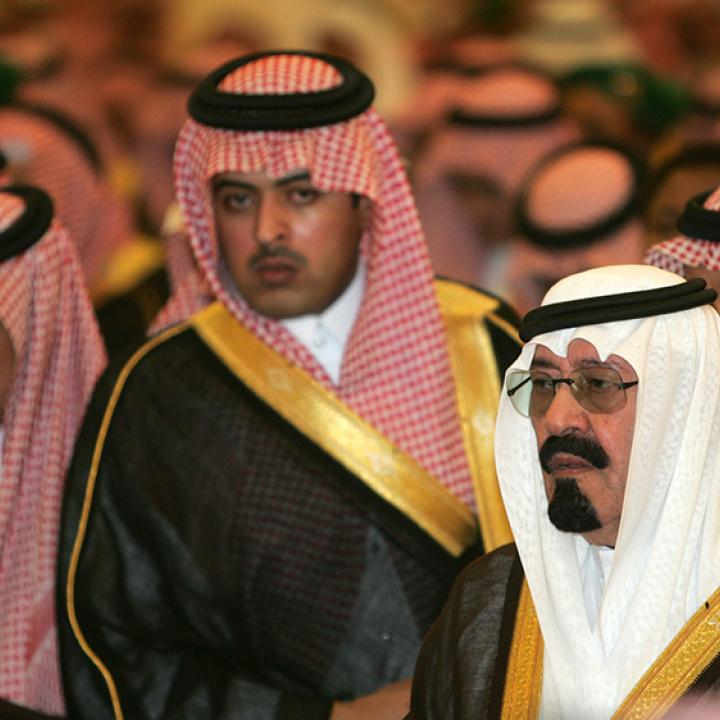
- Policy Analysis
- Policy Alert
Saudi Deputy Defense Minister Change Deepens Kingdom's Leadership Crisis

The June 28 announcement that Prince Khalid bin Bandar bin Abdulaziz had been relieved of his post after just six weeks means that the kingdom is about to have its fifth deputy defense minister in fifteen months.
Unusually, no immediate announcement was made of Prince Khalid's replacement after his dismissal as deputy defense minister this past weekend, but the frequency of the changes, especially when security concerns are multiplying given the expanded influence in Iraq of ISIS -- which recently shortened its name to the Islamic State (IS) with the declaration of a caliphate -- suggests dysfunctional administration and is likely worrying to the Saudi people as well as the kingdom's allies.
Although the royal order was issued by King Abdullah, the action was taken at the request of Crown Prince Salman, who also serves as defense minister. No reason was given, but speculation will increase about the mental health of the seventy-eight-year-old Salman, who is widely reported to be suffering from some form of dementia. Earlier this year, King Abdullah created the new position of deputy crown prince, a figure who would replace Salman in the event of his death or incapacity. The title belongs to Prince Muqrin, a younger half brother of both men, who won the advance oath of allegiance of the majority of senior princes. Muqrin has already been serving as second deputy prime minister but has so far only chaired the weekly council of ministers meeting once. That role is held tightly by Salman, who is deputy prime minister along with his role as defense minister. (The king remains the prime minister but rarely chairs the council these days.)
Despite his advanced years at ninety-one and corresponding tendency to tire easily, King Abdullah remains focused on the kingdom's security issues, sitting with visiting U.S. secretary of state John Kerry for a reported three and a half hours on June 27. Washington and Riyadh are at odds on how to deal with the Iraq crisis, with the Saudi monarch determined not to allow any increase in Iran's influence in Baghdad but fearful that the United States will concede to Iran either a political or military role.
The Abdullah-Kerry meeting came a day after a rarely publicized meeting of the Saudi National Security Council, at which the king ordered "all necessary measures to protect the gains of the homeland and its territories in addition to the security and stability of the Saudi people," a wording that seemed ambiguous in defining the threats facing the kingdom. The main implied threat was the Sunni Muslim ISIS, though the king also worries about Iran's support for its Shiite Muslim coreligionists in Iraq, Bahrain, as well as the kingdom's own Eastern Province. At a message read out on his behalf to begin the fasting month of Ramadan on June 28, the king appeared more explicit about ISIS, saying, "We will not allow a group of terrorists to take this religion as a shelter in order to serve their personal interests to horrify the Muslims or target our homeland or any citizens or residents."
The Saudi NSC meeting was also significant in that it is the residual power base of former Saudi ambassador to the United States Prince Bandar bin Sultan, who was sacked as head of intelligence in April, apparently because of his inability to work with Washington over support for anti-Assad fighters in Syria. Bandar had appeared to vanish into obscurity until he was announced as being a participant in the short but apparently significant June 20 summit meeting between King Abdullah and President Abdul Fattah al-Sisi of Egypt, held in the small top-deck compartment of the monarch's 747 jet during a Cairo stopover.
The Saudi NSC may be becoming a more significant body in Riyadh's decisionmaking, while Saudi intelligence, known as the General Intelligence Presidency, takes a lesser role. Bandar was replaced at the GIP by a nonroyal with a background in civil defense. Since his departure, an ambitious plan to transform the organization and its working procedures has been abandoned, with key personnel reassigned to other posts.
Simon Henderson is the Baker Fellow and director of The Washington Institute's Gulf and Energy Policy Program.



